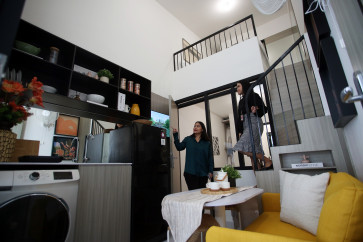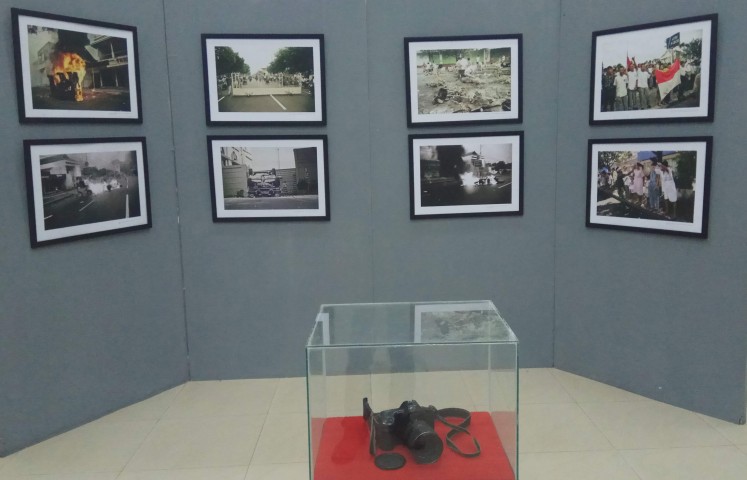Popular Reads
Top Results
Can't find what you're looking for?
View all search resultsPopular Reads
Top Results
Can't find what you're looking for?
View all search resultsChina finds home in Morowali
Asbut, 45, a resident of Morowali regency, in Central Sulawesi used to know every person living in his village, Keurea
Change text size
Gift Premium Articles
to Anyone

Asbut, 45, a resident of Morowali regency, in Central Sulawesi used to know every person living in his village, Keurea. But lately, it seems like everyone is a stranger.
A multibillion-dollar injection by Chinese investors into the area has turned backwater Morowali into a new economic center almost overnight, luring people from across Sulawesi to sip the honey pot from the development of a giant industrial estate.
For China, Morowali is an epitome of a success story in its push to exert its economic might in Southeast Asia. China strives to turn the regency into the world’s biggest center for integrated nickel-content stainless steel production.
“New people are coming here every day to work for the company [IMIP], mostly from the southern part of Sulawesi, including the Torajan or Bugis ethnic groups [from South Sulawesi],” Asbut, the head of hamlet V in Keurea, told The Jakarta Post last month.
Keurea and 11 other villages in the Bahodopi district in Morowali are at the epicenter of the development by PT Indonesia Morowali Industrial Park (IMIP), a joint venture between China-based Shanghai Decent Investment Group and local mining firm Bintangdelapan Group, which is linked to several retired military generals.
“As of today, we have invested around US$5 billion to developing the Morowali industrial complex and its supporting infrastructure, including one for our nickel mines,” IMIP chief executive officer Alexander Barus told the Post.
IMIP has set a deadline of mid-2019 to complete development in the complex, and it expects to employ nearly 25,000 workers.
After commencing construction of the estate in the third quarter of 2013 from scratch, IMIP now employs more than 15,000 Indonesian workers, more than double the number of registered residents in Bahodopi.
The investment by IMIP has drastically reduced poverty in Morowali from 18.85 percent in 2011 to 15.13 last year, although it remained far higher than the national poverty level of 10.86 percent, according to the Central Statistics Agency (BPS).
The investment has seen the level of unemployment in Central Sulawesi drop to 3.85 percent in August, among the lowest in the country.
“Since IMIP has its operation here, many people come to Morowali for work. This has opened up many business opportunities for us, such as renting out places and opening food stalls,” said resident Gazali, a coffee shop owner.
While Morowali residents in general are economically better off than five years ago, anti-Chinese sentiment is growing because IMIP is accused of employing too many illegal Chinese workers.
As of October, it has around 2,500 Chinese workers in the industrial complex, some 1,500 of whom are categorized as experts and already have proper work permits, while the other 1,000 are construction workers with “pending permits.”
Three IMIP workers interviewed by the Post said the actual number of Chinese workers could reach between 5,000 and 6,000.
They are prohibited from roaming around outside the industrial compound.
The Investment Coordinating Board (BKPM) has issued a recommendation for 1,072 foreign construction workers to be employed at the complex, far more than the 137 listed in IMIP’s latest investment activity report (LKPM) that was submitted to the agency for the period of January to June.
The influx of Chinese workers has heated up anti-Chinese sentiments among the locals because they believe the foreigners have taken their jobs.
“People of Bahodopi stage a rally from time to time outside the industrial complex, demanding equal opportunities. But the company has never listened to us,” said Asbut.
IMIP senior vice president for external relations Slamet Viktor Panggabean said the Chinese workers were inevitable because they were employed by Chinese companies that won the bidding rights for many procurements needed by IMIP.
Slamet said the Chinese workers were sent by the winning firms to provide construction guarantees and to supervise the installation of many components, leaving IMIP with no other option but to employ the workers before their permits were cleared.
“It will take at least three months for us to process all of their work permits,” he said.
“It is a problem because once you have signed the contract [with suppliers from China], the construction must begin immediately. Otherwise, the investment schedule will be ruined.”









